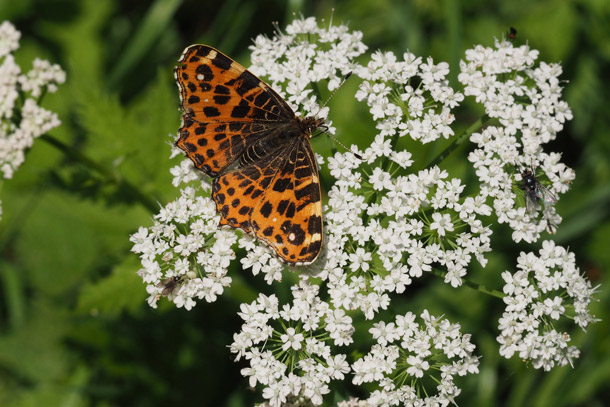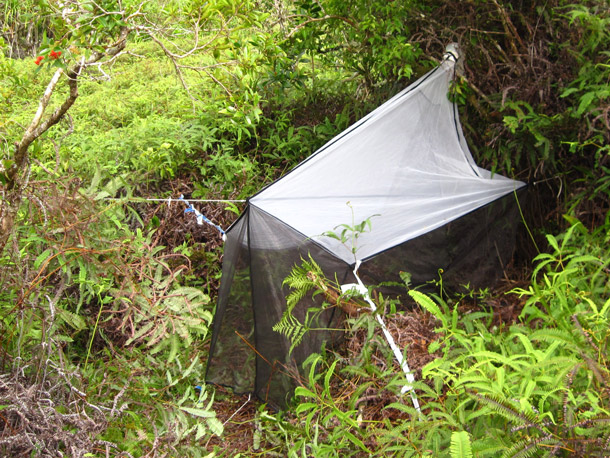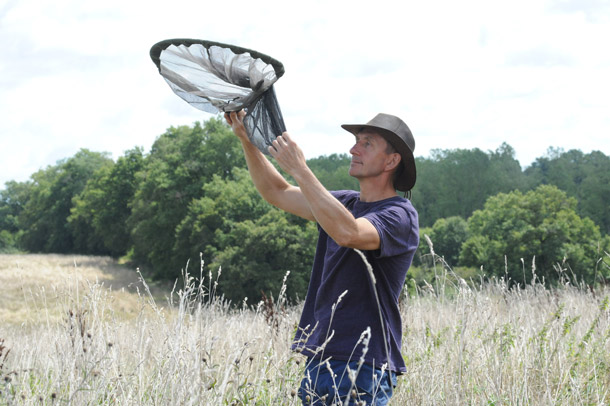Flying Insects Crash
Air Date: Week of October 27, 2017

The abundance of flying insects has dropped by over 75% in the past 25 years based on data from nature reserves across Germany. (Photo: Michael Mueller, Flickr CC BY 2.0)
The disappearance of many bees and butterflies has concerned scientists and the public for years, and now a new study from Germany confirms that the abundance of all flying insects has dropped over 75% since 1989. Dave Goulson, Professor of Biology at the University of Sussex in the UK, discusses the probable causes with host Steve Curwood, and says the problem is so serious, it could lead to an “Ecological Armageddon.”
Transcript
CURWOOD: From PRI, and the Jennifer and Ted Stanley Studios at the University of Massachusetts, Boston, this is Living on Earth. I’m Steve Curwood. Well folks, there is a bunch of troubling news this week. For starters, scientists who are studying a surprising loss of flying insects are calling it “Ecological Armageddon.” Of course insects can be annoying or even dangerous, from flies that carry cholera and dysentery to mosquitoes that spread West Nile and malaria. But butterflies and lightning bugs are beautiful and charming, and others can be friendly, like the dragonfly. And insects work very hard to feed us. They are also food for birds, bats and frogs, and they pollinate many plants, including food crops central to human civilization. But now civilization is destroying them. The journal PLOS One reports that amateur entomologists in Germany have discovered that since 1989, some three-quarters of flying insects there have vanished from nature preserves. Study team member Dave Goulson teaches Biology at the University of Sussex in the UK and I asked him why this is such a perilous development.
GOULSON: So, flying insects, most insects, they make of the bulk of life on Earth. About two-thirds of all species we know are insects. They pollinate more than 80 percent of all the plant species on Earth so if we lose the flying insects we will lose all the flowers on Earth, literally all of them. Flowers evolved to attract insects, that's why we have them. Three quarters of our crops need pollinating by flying insects. So, we’d have a world without most fruit and vegetables. They do other things too. They help to keep pests under control. They recycle dung and so on, and they're food for the majority of other creatures. So, even if you hate insects and many people do, but most people think birds are rather attractive and like to see them in the garden or whatever. Well, most birds at some stage of their life cycle eat insects. Almost all reptiles, amphibians, aquatic fish, bats, lots of small mammals, all depend on insects. So, essentially take away the insects and everything else is going to collapse.
CURWOOD: You've convinced me that we're in lot of trouble without them. Talk to me about the data that you have looked at here. What is it and how did it come together?
GOULSON: So, a group of German entomologists back in the 1980s took it upon themselves to start insect trapping our nature reserves scattered all over Germany. They used things called malaise traps which look a bit like a small tent which catch flying insects, bump into them and fall into a pot basically, and they've been doing it ever since from their own kind of interest. I got involved relatively recently, a couple of years ago, when this data kind of finally came to light and we realized what a kind of treasure trove of information it could be. And when we started looking at it we couldn't quite believe what it showed, which was just this wholesale disappearance of insects. The daily catch of insects has fallen by three-quarters, a little over three-quarters in 26 years which suggests a scale of insect decline that was just...we knew things weren't going well, we knew that butterflies are in decline and so on but there was very little other monitoring of insects going on and so we had no idea just how dramatic it had been until we saw these numbers.
CURWOOD: What do you suspect is behind this decline? As we were getting ready to talk to you, we raised the question of the neonicotinoid insecticides which started being used in the 80s about the time this decline begins. How much of a suspect are the neonicotinoid insecticides?

Amateur entomologists used malaise traps, similar to the one above, to capture and measure the weight of flying insects in nature reserves across Germany, starting in 1989. (Photo: ap2il, Flickr, CC BY-NC 2.0)
GOULSON: I think it's very likely they are playing a role. Whether they're the main driver or not is hard to say. The broad picture I think is that essentially the way we grow food these days makes the environment completely hostile to more or less all forms of life. It isn't just neonicotinoids. We grow these huge monocultures of crops, great big fields, which typically in Europe get about 20 different pesticides applied to them, each crop cycle including maybe four or five different insecticides, whole bunch of fungicides, things to kill slugs, herbicides to control the weeds. So, there's just no scope for anything to survive there apart from the crop and if we cover the landscape in fields like that, then we probably shouldn't be surprised when we see wildlife disappearing. These neonicotinoids have got a lot of attention because they are particularly toxic to insects like bees and it takes just three billionths of a gram of one of those things to kill a honeybee and we're applying hundreds of thousands of kilos of them to the landscape every year, so it's undoubtedly contributing to it, to the loss of our insects. But they are just part of the whole system of farming which is entirely dependent on one type of pesticide or another and that's what we need to look at I think.
CURWOOD: Just another detail on neonicotinoids. I gather that they're not exactly being sprayed on the insects that are being lost, but they're in the ecosystem. How does that work?
GOULSON: So neonicotinoids are usually used as seed dressings. The farmer buys seed pre-coated with a layer of insecticide and he sows the seed in the ground and they're water-soluble. They dissolve in the damp soil and they're supposed to be sucked up by the crop plant and they spread to all of its tissues which sounds like a kind of neat system if you're a farmer. It protects the plant against insect pests. The trouble is if it's a flowering crop they go into the pollen and the nectar and then when the bee comes to pollinate the crop, something like oil seed rape, canola, sunflowers, the bee gets a dose of neurotoxin. But there's more to it than that because it also turns out that the bulk of the insecticide doesn't get taken up by the crop at all, it's just going into the soil and accumulating in the soil, leaching into streams or being taken up by the roots of wildflowers or hedge row plants growing near the crops.
So, we're finding these chemicals turning up in places we didn't expect them including the pollen and nectar of wildflowers. So, there was a recent study showing that 75 percent of honey samples taken from all over the world contain nearly neonicotinoids showing just kind of the scale, the ubiquity of these chemicals, that basically if you're a bee anywhere in the world, the chances are your food contains neurotoxins that will kill you at really tiny doses, and that surely can't be a good thing.
CURWOOD: Now, aside from the neonicotinoids, you point out that there are a whole bunch of other chemicals that might be implicated in this dramatic decline. What kind of chemicals are we talking about?
GOULSON: So, there are other insecticides things like pyrethroids and organophosphates. Probably the listeners out there these things don't mean very much, but organophosphates are pretty horrible. They were actually developed in Germany in the Second World War with the aim of killing people. Most of them have been banned but there are still some that are used in farming. There are lots of fungicides. The fungicides, you think well they're not going to harm insects, but actually some of them have this strange effect...they knock out the detoxification mechanism of the bee. So although the fungicide itself isn't poisonous…if an insecticide is simultaneously exposed to a fungicide and an insecticide, the insecticide is effectively much more potent. It can be up to a thousand times more toxic, and then the herbicides just get rid of the weeds so there are no flowers apart from the crop if that flowers. So, although they may or may not be poisonous to the – to the bees directly, if they get rid of their food then that's just as bad, so it's this kind of cocktail, the poor bees, you know, they're going out there, they're struggling to find food and when they do find food it's got a mixture of pesticides in it. And so, we shouldn't really be surprised that bees and other flying insects aren't doing so well.
CURWOOD: So, this is data that was gathered in Germany. I've noticed in the US, for example, where I live, that I don't see lightning bugs anymore, and black flies seem to have a much shorter season in Maine and so forth, but what about the tropics? Is there a similar sort of decline there?
GOULSON: It would be hard to extrapolate with any certainty at all. The tropics are different in many ways that there's still more natural habitat left generally not in all but in most places like the UK and Germany. Essentially everything is managed land. You have some wilderness left in the United States and in Germany in the UK we have none. It's all farmland or cities and little tiny nature reserves scattered amongst them. So, there's no reason to really believe that it wouldn't be similar in most of Europe, in the developed world, but in the tropics we don't know. Clearly there's massive habitat loss going on right now or in tropical countries that we still seeing these devastating loss of tropical forests that for all my life, we've been talking about how we really need to stop cutting down the trees. These rainforests are teeming with life, that they're vital for regulating the climate and all sorts of other things, and yet sadly you know we're still hacking them down to create oil palm plantations and to grow soybean in Brazil and so on. So, my guess is insects are declining there too but I couldn't tell you whether the pace of change is the same or different.

Dave Goulson is a Professor of Biology at the University of Sussex and was part of the team investigating the precipitous insect decline. (Photo: courtesy of Dave Goulson)
CURWOOD: So E.O. Wilson, the biologist at Harvard University, famously once said and I think this is a paraphrase, that if we lost the ants, just losing the ants, we would lose humanity. What do you think this huge loss of insects means for humanity?
GOULSON: If we lose insects we're doomed, I know this sounds overly dramatic but we absolutely are. Life on Earth would be utterly changed. We wouldn't be able to grow our crops. Dung would build up in the fields. Life on Earth would essentially cease, so we absolutely have to take this really seriously, and it's something that I find enormously frustrating that we seem to live in a world where people are very detached from the environment. They don't know where their food comes from, they – they seem to not realize that actually even if you live in a city, we are part of the environment, we depend upon the health of ecosystems to provide us with places to grow our food, to provide clean air and clean water and so on, and that a healthy environment should be our number one priority. Forget the economy, forget the health service, forget the rest of it. None of those things will matter if we don't have a healthy environment because everything else will collapse, and it really – it drives me nuts that politicians on the whole don't often talk about the environment. It gets very little attention and we're always worried about short-term economics and so on, but actually we need to think slightly longer-term and look after the planet.
CURWOOD: Professor, what could be done to slow this trend, this rapid loss of insects?
GOULSON: I'd love to see a major rethink of how we produce food. This idea that we need these great big fields full of monocultures of crops. There are other ways of growing food. I'd love to see it move towards small-scale production, get more people back onto the land and small farms producing food for local consumption. We should really tackle food waste because we grow all this food at huge cost to the environment and then we throw away about a third of it which is absolutely insane. We eat too much meat. If we could convince people not to eat so much beef in particular then that could massively reduce our footprint on the planet, so there are things we could do but they all require buy in from significant numbers of people, you know, one or two environmentalists like me banging on isn't going to do anything. We need the majority of people on Earth to change their ways and that's a pretty difficult thing to achieve.
CURWOOD: Entomologist David Goulson is a professor and biologist at the University of Sussex in the UK. Thanks so much for taking the time with us today.
GOULSON: My pleasure.
Links
The Guardian: “Warning of ‘ecological Armageddon’ after dramatic plunge in insect numbers”
Living on Earth wants to hear from you!
Living on Earth
62 Calef Highway, Suite 212
Lee, NH 03861
Telephone: 617-287-4121
E-mail: comments@loe.org
Newsletter [Click here]
Donate to Living on Earth!
Living on Earth is an independent media program and relies entirely on contributions from listeners and institutions supporting public service. Please donate now to preserve an independent environmental voice.
NewsletterLiving on Earth offers a weekly delivery of the show's rundown to your mailbox. Sign up for our newsletter today!
 Sailors For The Sea: Be the change you want to sea.
Sailors For The Sea: Be the change you want to sea.
 The Grantham Foundation for the Protection of the Environment: Committed to protecting and improving the health of the global environment.
The Grantham Foundation for the Protection of the Environment: Committed to protecting and improving the health of the global environment.
 Contribute to Living on Earth and receive, as our gift to you, an archival print of one of Mark Seth Lender's extraordinary wildlife photographs. Follow the link to see Mark's current collection of photographs.
Contribute to Living on Earth and receive, as our gift to you, an archival print of one of Mark Seth Lender's extraordinary wildlife photographs. Follow the link to see Mark's current collection of photographs.
 Buy a signed copy of Mark Seth Lender's book Smeagull the Seagull & support Living on Earth
Buy a signed copy of Mark Seth Lender's book Smeagull the Seagull & support Living on Earth

